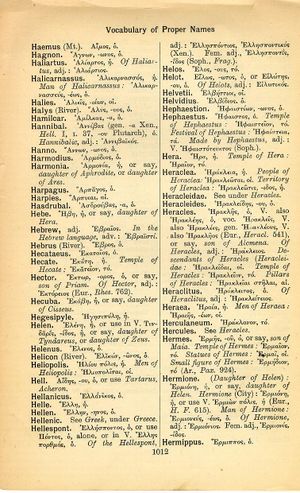Hera: Difference between revisions
αὐτόχειρες οὔτε τῶν ἀγαθῶν οὔτε τῶν κακῶν γίγνονται τῶν συμβαινόντων αὐτοῖς → for not with their own hands do they deal out the blessings and curses that befall us
m (Text replacement - "link={{" to "link={{") |
m (Text replacement - "(|thumb)\n(\|link=)" to "$1$2") |
||
| Line 1: | Line 1: | ||
{{WoodhouseENELnames | {{WoodhouseENELnames | ||
|Text=[[File:woodhouse_1012.jpg|thumb | |Text=[[File:woodhouse_1012.jpg|thumb|link={{filepath:woodhouse_1012.jpg}}]]Ἥρα, ἡ. | ||
|link={{filepath:woodhouse_1012.jpg}}]]Ἥρα, ἡ. | |||
<b class="b2">Temple of Hera</b>: Ἡραῖον, τό. | <b class="b2">Temple of Hera</b>: Ἡραῖον, τό. | ||
Revision as of 16:50, 18 May 2020
English > Greek (Woodhouse)
Ἥρα, ἡ.
Temple of Hera: Ἡραῖον, τό.
Latin > English (Lewis & Short)
Hēra: ae, f., = Ἥρα,
I another name of Hybla Minor in Sicily, Cic. Att. 2, 1, 5.
Hēra: ae, f., = Ἥρα,
I the Grecian goddess Hera, corresp. to the Juno of the Romans, Sol. 2, 10; Inscr. Orell. 2225 (although here, perh., HERA is i. q. FORTVNA). —
II Deriv.: Hēraea, ōrum, n., = Ἡραῖα, τά, the festival of Hera, Liv. 27, 30, 9 sq.
Latin > French (Gaffiot 2016)
(2) Hēra, æ, f. (Ἥρα),
1 la déesse Héra [Junon chez les Romains] : Sol. 2, 10
2 v. de Sicile : Cic. Att. 2, 1, 5.
Latin > German (Georges)
(2) Hēra2, ae, f. (Ἥρα), die Göttin Hera der Griechen, die Juno der Römer, Solin. 2, 10. – Dav. Hēraea, ōrum, n. (Ἡραια), das Herafest (mit öffentlichen Spielen verbunden), Liv. 27, 30, 9.

